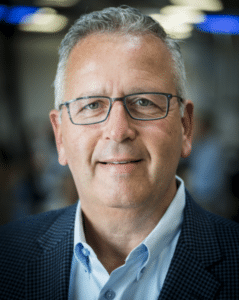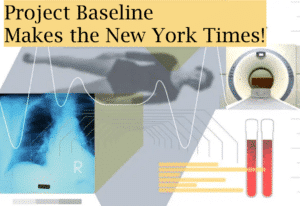Blog
Archive for the ‘Dr. Sanjiv Gambhir’ Category
Canary Scientists are on the right track!
October 14, 2021
Canary Center continues as a world class facility, acting as a hub for innovative research, collaborations, cross-disciplined studies, and international partnerships.
After their train ride, our scientists gave an informative update at a recent meeting observing distancing measures. Subjects covered included the Canary Center at Stanford, Ovarian and Prostate Programs and examples of work from the lab of Dr. Joseph DeSimone, who has been appointed as the inaugural Sanjiv Sam Gambhir Professor in Translational Medicine.
Below are two highlights and a link to a 2-page report.
Canary Ovarian Initiative is focusing on the microenvironment of the fallopian tubes, high grade serous carcinoma originates in the fallopian tubes, to look for changes that signal cancer.
- Using bioinformatics and methylated DNA to determine origins of ovarian cancer.
- Looking for changes in the fallopian tubes decades before cancer can be diagnosed, especially for high risk women (i.e. BRCA mutations). Single cell sequencing – looking for changes in cells that can signal cancer early.
- Remaining patient-focused for compassion and team-focused for efficiency.
Prostate Cancer Team and the Prostate Active Surveillance Study (PASS), more than a decade on, helps patients in the study as well as informing the medical profession on ways to understand which men are at greatest risk, requiring aggressive treatment versus those who have slow growing cancer. Recent Pass accomplishments include:
- Advanced imaging with MRI.
- African Americans do not have worse outcomes in active surveillance
- Created models to predict non-progression.
- Fewer painful prostate biopsies.
- PASS Risk calculator to aid patients and physicians with decisions.
- High risk patients (BRCA mutation) personalized screening.
Read the full update report here:
Canary Foundation Welcomes Dr. Joseph DeSimone
November 22, 2020

Dr. Joseph DeSimone
We welcome Professor Joseph M. DeSimone, PhD. in the position of the Sanjiv Sam Gambhir Professor in Translational Medicine. We are fortunate to have such creative and capable leadership as our work together in cancer early detection continues.
From the Stanford Press Release: The Stanford Department of Radiology is proud to announce Professor Joseph M. DeSimone as the inaugural Sanjiv Sam Gambhir Professor in Translational Medicine. A shining example of achievement, Joe has been described as “an igniter of innovation”. He has received international recognition as a scientist, inventor, and entrepreneur, earning major accolades including the U.S. Presidential Green Chemistry Challenge Award, the 2017 Heinz Award, and the Lemelson-MIT Prize. He is one of only 25 individuals elected to all three U.S. National Academies—the National Academy of Sciences, Medicine, and Engineering. In 2016, President Obama presented him with the National Medal of Technology and Innovation, the highest honor in the U.S. for achievement and leadership in advancing technological progress. Read more here.
Joe and his lab have made significant scientific breakthroughs in science and medicine including next-generation approaches to cancer treatment and diagnosis, implantable drug delivery devices, green chemistry, and most recently in 3D printing technology for medical devices tailored to an individual patient’s needs. A dedicated educator and strong advocate for bringing a broader diversity of perspectives into research, he has mentored over 80 students through PhD completion at Univ. of North Carolina and North Carolina State Univ. (his former 30-year career), half of whom were women and members of underrepresented groups in STEM.
As an avid researcher and innovator, Joe has authored over 370 scientific publications with over 42,000 citations to his work, and is a named inventor on over 200 issued patents. Additionally, he brings a unique ability to transfer novel solutions from his lab to the world through the companies he co-founded.
The Canary Center at Stanford – A word from our researchers on safely reopening
September 16, 2020
Over the years, Canary Foundation has helped researchers develop successful ways of working together over distance, and we draw on that experience during these times.
A message on the Canary Center re-opening from:
Dr. Utkan Demirci, Co-Director, Canary Center at Stanford
Dr. Ryan Spitler, Deputy Director of the Precision Health and Integrated Diagnostics Center
Dr. Sharon Pitteri, Associate Professor, Canary Center at Stanford
We discover ways to move forward while staying safe. From the very early arrival of COVID-19, we have been able to successfully keep the Canary Center vibrant with virtual interactions and with safety in mind. We have implemented measures for social distancing, and staggered laboratory shifts as we follow the guidance on re-opening stages from the Radiology department and Stanford University. We are using our time out of the lab well. Many researchers have taken this hard-to-find time to focus on data analysis, writing manuscripts, reading scientific literature, and developing new ideas for future projects. We also are exploring intersecting dimensions between cancer and COVID-19 related research. We have asked ourselves this question: how are we uniquely positioned to contribute to the pandemic crisis through the work we are doing in cancer early detection?
We look after each other. Everyone working in the Center has committed to the safety and well-being of every other Canary member. This is key. Each research group also has their own independent safety plan to ensure they are aware of their colleagues as well as their specific research needs. Collectively, we have been building up our research efforts in phases.
We will continue to push forward to detect cancer before it strikes and support COVID-19 related efforts. Take our Smart Toilet system. The Smart Toilet system is a wave-of-the-near-future method of collecting important changes in biodata to serve personalized medicine. We have been able to modify our Smart Toilet system originally designed for early cancer detection to also be used as a screening tool to detect COVID-19. This approach enhances longitudinal testing and serves to detect very small, early changes. Unnecessary exposure is also limited for the patient and the health care provider who normally must come in close proximity for a nasal swab that often triggers a cough or sneeze.
Human health is our passion and one that burns strongly no matter what challenges we face.
To better envision the opening of the Canary Center, please enjoy this brief video.
Sanjiv Sam Gambhir, pioneer in molecular imaging, Director of the Canary Center at Stanford for Cancer Early Detection, dies at 57
July 21, 2020
From Stanford University News:
 Sanjiv Sam Gambhir, MD, PhD, professor and chair of radiology at the Stanford School of Medicine and an internationally recognized pioneer in molecular imaging, died July 18 of cancer. He was 57. He was a global leader in advancing techniques for molecular imaging and early cancer detection.
Sanjiv Sam Gambhir, MD, PhD, professor and chair of radiology at the Stanford School of Medicine and an internationally recognized pioneer in molecular imaging, died July 18 of cancer. He was 57. He was a global leader in advancing techniques for molecular imaging and early cancer detection.
Below is the message that Lloyd Minor, MD, dean of the School of Medicine, shared with the community on July 18.
Words cannot express what an immense loss this is personally, for our Stanford community, and for the field of medicine.
Sam was an uncommonly talented physician-scientist. As the Virginia and D.K. Ludwig Professor in Cancer Research and director of the Molecular Imaging Program at Stanford (MIPS), Sam earned international recognition as a pioneer of molecular imaging. He authored nearly 700 peer-reviewed articles, several books, filed for 40 patents, and his lab’s work has been featured on dozens of journal covers. But Sam was most proud to see many of his discoveries translate to the clinic, which today benefit patients around the globe.
To many of us, however, Sam was much more: a dear friend. His kindness, sense of humor, and graceful way with people were among his defining qualities and will be sorely missed by those who knew him.
I first met Sam in 2012 when he was serving as co-chair of the search committee that selected me to be Dean. It was then that I immediately understood why he is so revered at Stanford Medicine and across the university. As a leader and as a person, Sam exemplified through his life the best of Stanford and the highest values to which we aspire.
Many of us witnessed Sam’s courage and tenacity during the 21 months that he and his wife Aruna fought for the life of their son Milan, who passed away in 2015 at the age of sixteen. Sam understood the fragility of human health and worked every day to apply his genius to research focused on diagnosing disease in its earliest and most treatable stages.
Sam was an advocate for precision health long before it was popularized. In recent years, he dedicated his life to the early detection of cancer as director of the Canary Center for Cancer Early Detection at Stanford. In 2016, he established the Precision Health and Integrated Diagnostics (PHIND) Center to help create the future he envisioned for health care—a world in which technologies continuously monitor our health to keep us healthy.
Throughout his prolific career, he mentored more than 150 postdoctoral fellows and graduate students. These leaders, representing more than ten disciplines, will carry on his legacy.
I hope that we may come together as a community, virtually and in spirit, to support each other during this difficult time and to share our memories of Sam—a scientific visionary, a trusted mentor, a beloved colleague and friend.
In lieu of flowers, the Gambhir family prefers donations to the PHIND Center, the Canary Center for Cancer Early Detection at Stanford, the Ben and Catherine Ivy Foundation, or The Sanjiv Sam Gambhir Professorship in Translational Medicine.
Sincerely,
Lloyd Minor
Canary Foundation congratulates Dr. Sanjiv Sam Gambhir on receiving the 2020 European Society of Molecular Imaging award.
July 6, 2020

From the Stanford press release:
Sanjiv Sam Gambhir, MD, PhD, the Virginia and D.K. Ludwig Professor for Clinical Investigation in Cancer Research and Chair of the Department of Radiology, has received the 2020 European Society of Molecular Imaging (ESMI) annual award.
“The Committee recognizes Sam as one of the founding fathers of the field in which we all have the privilege to work. He has been a pioneer and visionary, a mentor and inspiration – thanks for your continuous and passionate dedication for imaging science.”
The ESMI Award is given to an excellent scientist for her/his outstanding contribution to the interdisciplinary research in Imaging Science. The nominee must have contributed significantly to the knowledge in this field.
Congratulations, Dr. Gambhir!
Project Baseline aims to map human health
February 3, 2019
 What if we could view changes in the body earlier than early to warn of possible disease? That is the aim of Project Baseline, to map human health. The New York Times published “Project Baseline Aims to Ward Off Illness Before We Get Sick” by Anahad O’Connor (Oct 2018). The study is recruiting 10,000 adults. And each will be examined and followed for at least four years. So the goal is to discover the earliest warning signs of cancer, heart disease and other killers. Participants, the first of whom was enrolled in 2017, are called Baseline Explorers.
What if we could view changes in the body earlier than early to warn of possible disease? That is the aim of Project Baseline, to map human health. The New York Times published “Project Baseline Aims to Ward Off Illness Before We Get Sick” by Anahad O’Connor (Oct 2018). The study is recruiting 10,000 adults. And each will be examined and followed for at least four years. So the goal is to discover the earliest warning signs of cancer, heart disease and other killers. Participants, the first of whom was enrolled in 2017, are called Baseline Explorers.
Project Baseline is the result of conversations in 2013, led by Google X’s Andrew Conrad. He consulted with Dr. Sam Gambhir, MD, chair of Radiology at Stanford University and director of the Canary Center for Cancer Early Detection. And also with Robert M. Califf, MD, professor of Cardiology in the School of Medicine, Duke University.
Conrad (now CEO of Verily, a spin out of Google X) was interested in exploring with these two notable healthcare thought leaders, one in cancer and the other in cardiology, about how to create what has become a landmark study. Both had deep experience in working with large patient cohorts and focus on early detection of disease. The project has formed teams across the country.
Seeking to create a baseline of health
Traditional trials focus on those who have a disease. So Project Baseline, as the name implies, mainly enrolls healthy individuals gathering enormous amounts of information. Baseline equips enrollees with wearable technology from Verily that tracks sleep patterns, heart rhythms and physical activity. The team is developing tools and technologies to collect, organize, analyze and curate the data.
And investigators are determining the best ways to share data with participants that is helpful to them. They are looking at how they can engage with their medical professionals.
Canary Foundation and the Canary Center at Stanford for Cancer Early Detection
Dr. Gambhir has served as Canary Foundation’s scientific director for more than a decade. He led the development of the Canary Center at Stanford for Cancer Early Detection. The Canary Center is a partnership forged in 2008 between Stanford University and Canary Foundation under the leadership of Don Listwin, based on the foundation’s mission. And interesting to know, Canary Center is the first program Stanford has focused entirely on cancer early detection.
